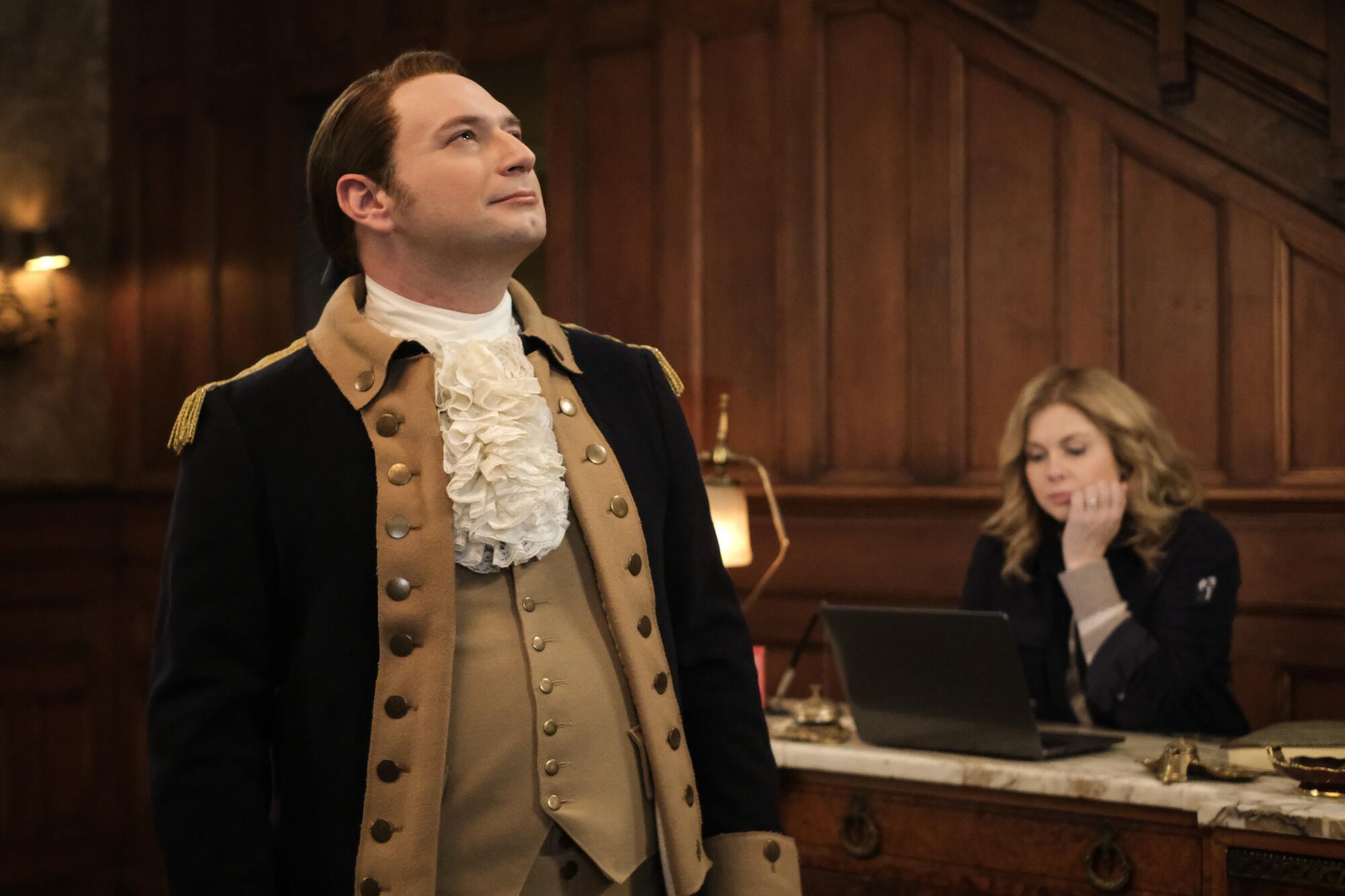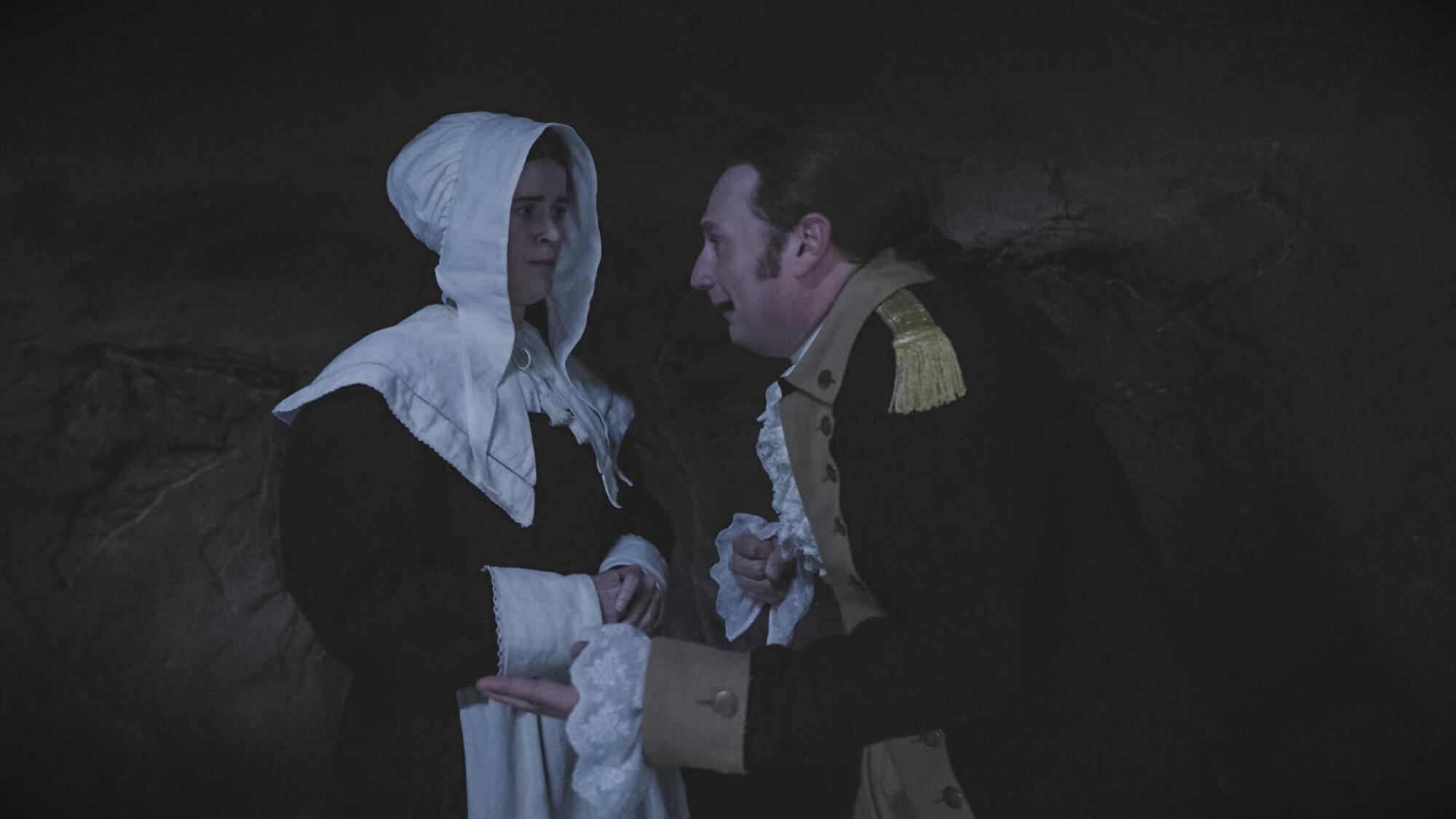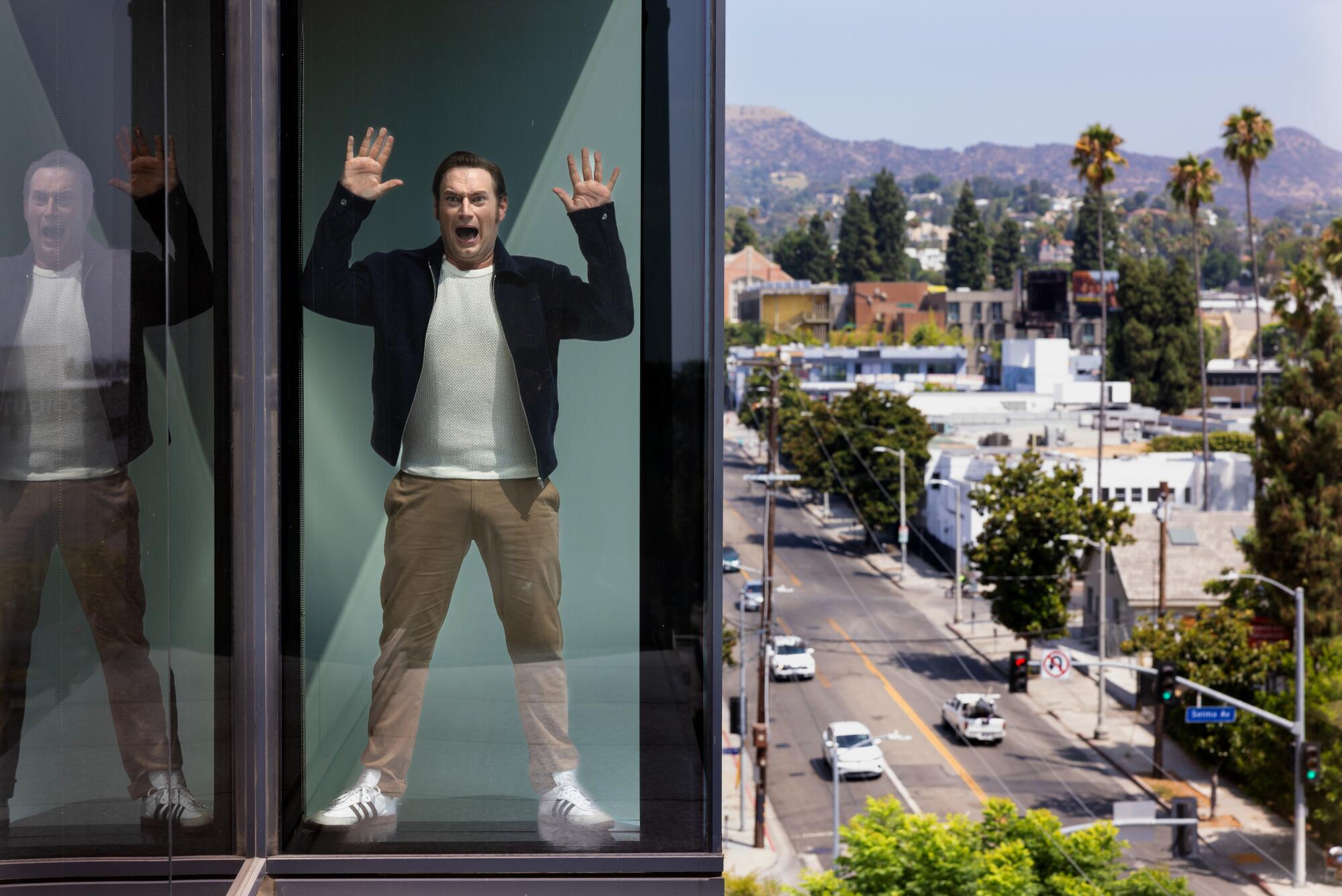When Brandon Scott Jones was in seventh grade, his mother bought him a copy of “The Elements of Screenwriting.”
Spurred by his interest in actors Matt Damon and Ben Affleck, whose turn to writing resulted in the Oscar-winning screenplay “Good Will Hunting,” Jones says he had “one goal, which was to write a part for myself in something, whatever it was.”
Unfortunately, Jones’ first attempt at screenwriting didn’t include the same kind of realism and lived experiences as Damon and Affleck’s story of a South Boston janitor who also happens to be a math prodigy.
“It was about a pornography director and it was called ‘Whatever Happened to Darren Potter?’” Jones says, laughing during an interview this summer over smoothies at the Silver Lake Erewhon.
His interest in writing came about because he’d broken away from the rest of the family during an outing to the multiplex for a repeat viewing of “Titanic” and snuck into a screening of “Good Will Hunting” instead. Then, when they went back to see “Titanic” again, he left and caught a snippet of Paul Thomas Anderson’s porn-industry drama “Boogie Nights.”
“This was an impressionable time where you were [at an age when you were] taking things in, so I wrote this screenplay about this prodigy actor — like ‘Good Will Hunting’ — and this pornography director,” Jones says. “There was no sex or anything like that. It was just that they were both trying to claw their way back to the top of the game.”

Jones had an early interest in writing and performing, but comedy versus drama turned out to be his strong suit.
(Christina House / Los Angeles Times)
This script, and other early material, were written on the typewriter Jones was given for Christmas when he was in fourth grade. He carried them in a briefcase. In eighth grade, the kid who sat next to him in math class would give him notes.
“Darren Potter” was, sadly, never produced (although Jones thinks he still has a copy of it somewhere in case anyone reading this is interested in setting up a meeting). Instead, his attempt at writing dramas has been parlayed into a career that utilizes something Jones has more familiarity with: self-deprecating humor.
Jones, a graduate of New York Conservatory for Dramatic Arts, got his start at Upright Citizens Brigade, where he was in the main cast of “Asssscat,” one of the improv house’s signature shows. He was then cast in Michael Schur’s NBC philosophical comedy “The Good Place,” winning critical praise for playing a Perez Hilton-like gossip blogger named John Wheaton. And in his film roles, he’s made meals out of small parts in “Renfield,” “Isn’t It Romantic?” and “Senior Year,” co-writing the latter, about a high school cheerleader who wakes up from a coma after two decades and becomes obsessed with returning to finish her senior year and reclaiming her popularity.
He achieved Notable Character Actor status when he was cast as Curtis, a struggling actor and best friend to Cary (Drew Tarver), in the Comedy Central and Max comedy “The Other Two.” It was a part he got literally at 6:30 a.m. one weekday while playing tennis. His friends, series creators Chris Kelly and Sarah Schneider, called him in a panic because another actor had dropped out of the series and they were about to begin shooting. An hour and a half later, he was on his way to the set. He’d eventually join that show’s writing staff as well.
Then came “Ghosts.” Created by Joe Port and Joe Wiseman and based on the British series of the same name, the CBS comedy falls somewhere between “The Good Place” and Jean-Paul Sartre’s dark existentialist play “No Exit.” As the show’s name suggests, it’s about spirits from different periods of American history who are, for reasons unknown to them, forced to spend eternity on the grounds of what is now a Hudson Valley estate.

In “Ghosts,” Brandon Scott Jones plays Isaac Higgintoot, who died of dysentery during the Revolutionary War.
(Bertrand Calmeau / CBS)
Jones plays Isaac Higgintoot, a member of the American Continental Congress who — appropriately, given his last name — died of dysentery while serving as a captain in the Revolutionary War. Isaac, who always felt like an outsider in life, is now furious that his contemporary Alexander Hamilton has everything from money to a book to a musical commemorating him. Meanwhile, Isaac wants to set the record straight that “I was never at the Boston Tea Party. I was in Boston at a tea party, but it was at my Aunt Geraldine’s house.”
“I think about him being constantly one step to the left of history,” says Jones, theorizing that Isaac could have been at the signing of the Declaration of Independence but probably got there late because he’d spilled something on his shirt. Or that he and his wife, Beatrice (played in flashbacks by Hillary Anne Matthews), were “unsuccessful Machiavellians,” who took it personally when snubbed for a dinner party invitation.
Thus far in the show, Isaac has convinced Sam (Rose McIver), a clairvoyant writer who took over the estate with her husband, Jay (Utkarsh Ambudkar), to write his biography because his Wikipedia page is severely lacking. Jones says that Isaac isn’t any different from one of TV’s more memorable (modern-day) political figures, such as Selina Meyer, the singularly focused politico played by Julia Louis-Dreyfus on HBO’s “Veep.”
“To retroactively want your life to have meant something, or to have been part of something, I think is really so fun and desperate,” Jones says.
Not that the afterlife has been too boring for Isaac. At least not in the last few years.
Each season of “Ghosts” has ended with major developments for Isaac. In the first, he realized that times have changed and it’s OK for him to come out as gay, some 250-odd years after his death. In the second, he gets engaged to Nigel (John Hartman), the ghost of a British soldier Isaac accidentally killed on the battlefield. In the third, he leaves Nigel at the altar and then is sucked into the ground by someone else he’d wronged: the ghost of a Puritan woman named Patience, who is played by Jones’ friend and “Senior Year” co-star Mary Holland.

In the Season 4 premiere of “Ghosts,” Brandon Scott Jones’ Issac faces a Puritan ghost named Patience, played by his friend and “Senior Year” co-star Mary Holland.
(CBS)
And now in Season 4 of “Ghosts,” premiering Thursday, audiences find out what exactly Patience has been plotting and whether any of the other estate’s living or dead inhabitants will even notice that Isaac is missing.
“I think the friendship [between us] helped it in a fun way because she’s such a great character actor and a great actor in general,” Jones says of Holland. “It was fun to be surprised by all the choices that she was making. At one point in the script, her character is described as, ‘unhinged and insane.’ So a lot of what you’re seeing, if I’m acting and I’m being terrified of her, it’s also an underlying level of delight watching my friend, which is really, really nice.”
Port and Wiseman stress that they mean no offense to other members of their extensive cast and that it’s merely a coincidence that each season has ended with a big Isaac storyline. They also say that there has been a conscious effort to not make Isaac’s queerness the defining thing about him or to push him into a flamboyant stereotype.

Brandon Scott Jones on playing Isaac Higgintoot in CBS’ “Ghosts”: “I think about him being constantly one step to the left of history.”
(Christina House / Los Angeles Times)
“He’s much more than just that one trait,” says Port. “He’s a military man. He’s a guy from the colonial days. He’s got a bunch of different factors to his character and personality.”
Jones, who is gay, ponders the question when asked if he thinks queer characters should be played only by queer actors.
“My genuine, honest opinion is that the process of playing a character is the process of finding empathy for somebody that you don’t know,” Jones says, noting that he felt a connection to Eric McCormack, a straight actor, and his portrayal of Will, a gay man, on NBC’s “Will & Grace.” “If we’re denying people the chance to kind of step into those shoes, then that’s problematic to me. If a straight person wants to play gay or a gay person wants to play straight, and we feel like we can’t do those things, then, to me, it starts to feel like it’s a snake eating its own tail.”
Modern-day fandom can be intense, so much so that the minuscule details of an actor’s personal life are dissected — a topic that was skewered in “The Other Two.” Jones says he doesn’t like that actors, writers or casting producers could feel “a massive desire to appease a crowd of people instead of just [play] the character.” But he also doesn’t want casting directors to claim that there are no gay actors for these types of roles simply because they’re not looking.
“I just hope that the stories that are being told are being told authentically, whether that means from behind the camera or the writer or anything like that,” says Jones, adding that “there’s also a part of me where I’m like, if somebody wanted me to play a straight character, I would like to think that I could do it.”
This season will see Isaac plunge further into his post-life crisis as he (sometimes literally) loosens his colonial-era ponytail and lets his hair down.
“After a breakup, he’s trying to reinvent himself,” Wiseman says. “He takes his hair down to see if that changes his attitude.” (He says this fits within the rules of “Ghosts,” which doesn’t permit the deceased to change what they’re wearing but does allow them modifications).
And fans will learn more about that biography.
“There’s a part of you that wonders does he just want a book about himself, regardless of how factually correct?” Jones teases.
Maybe Isaac, like the person who plays him, just wants to create a part for himself.
